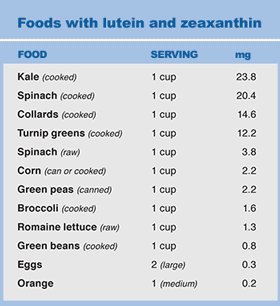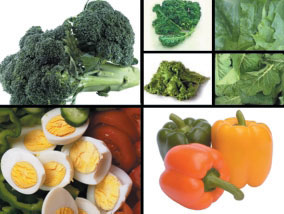Lutein and Zeaxanthin
Enjoy Lutein & Zeaxanthin Foods
Beneficial long-term effects of combined oral/topical antioxidant treatment with the carotenoids lutein and zeaxanthin
Skin elasticity, loose skin, skin turgor might be helped by a number of things. Chef amongst these is avoiding the sun. Once damage is done a double blind placebo controlled trial showed that lutein may be beneficial. Some have found by drinking freshly prepared juices containing beet greens, broccoli, collards, kale, leafy greens or pumpkin the smoothness of their skin has improved and there is a noticeable tightening.
Eye Health
The eye is a major sensory organ that requires special care for a healthy and productive lifestyle. Numerous studies have identified lutein and zeaxanthin to be essential components for eye health. Lutein and zeaxanthin are carotenoid pigments that impart yellow or orange color to various common foods. Many studies have confirmed that lutein and zeaxanthin reduce the risk of chronic eye diseases, including age-related macular degeneration (AMD), cataracts, night vision.
Zeaxanthin is not made in the human body it must come from food. Only one zeaxanthin form (3R, 3'R) is naturally found in fruits and vegetables and it is one the body prefers. Meso-zeaxanthin is an isomer of zeaxanthin. It is not found in a daily diet, but it is found in the macula. Meso-zeaxanthin is produced from lutein in the eye when there is not enough 3R, 3'R zeaxanthin available to the eye. Meso-zeaxanthin production in the eye can falter with age. Zeaxanthin is one of the most common carotenoid alcohols found in nature; it gives the yellow color to paprika and saffron.
Foods Highest in Lutein & Zeaxanthin:
beet greens
broccoli
cantaloupe
carrots
chard
chicory
corn
cress
collards
kale
kiwi
greens raw
mustard greens
orange
parsley
peas
pumpkin
romaine lettuce
saffron
spinach greens
squash
Swiss chard
turnip greens
Though high in lutein
egg yolks to be avoided, as they contribute to raising cholesterol
goji (wolf berries) avoid
peppers to be avoided, as they contain high amounts of oxalates

Macular Degeneration
Dietary Xanthophylls, lutein and zeaxanthin, may be effective in reducing the risk of getting age-related macular degeneration (AMD) or slowing its progression. Xanthophylls are only obtained from the diet; therefore a person's macular pigment levels may be dependent on dietary habits. A number of studies have found that lutein and zeaxanthin either help prevent macular degeneration or may slow progression of the disease:
Research published in Nutrition & Metabolism found that a nutritional supplement containing meso-zeaxanthin, lutein and zeaxanthin effectively increased the optical density of the macular pigment in eyes of the majority of human subjects. The macular pigment is believed to offer protection against the development of macular degeneration. Studies published in American Journal of Epidemiology, Ophthalmology and Archives of Ophthalmology found higher levels of lutein and zeaxanthin in the diet are associated with a lower incidence of AMD.
Two studies published in Investigative Ophthalmology and Visual Science found that eyes with greater levels of macular pigments were less likely to have or develop macular degeneration.
Cataracts & Night Vision—Riboflavin
A plethora of literature has shown that increased lutein consumption has a close correlation with reduction in the incidence of cataract and improving night vision. According to one study those taking in the most dietary riboflavin (B2 vitamin) had the lowest scores for developing cataracts, suggesting that dietary intake of B vitamins may affect the occurrence of age-related lens opacities.
Vitamin B2 Riboflavin
Riboflavin is necessary for the body. Lack of it can lead to anemia. It is necessary in converting glutathione, which is one of the most important antioxidants in the human body. B2 plays a key role in energy production.

Egg yolk and bell peppers are not beneficial for cystic organs.